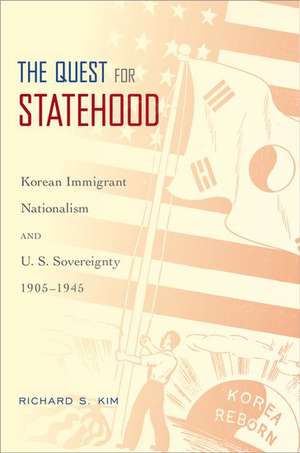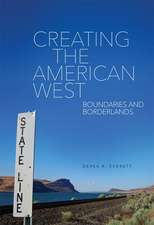The Quest for Statehood: Korean Immigrant Nationalism and U.S. Sovereignty, 1905-1945
Autor Richard S. Kimen Limba Engleză Paperback – 8 dec 2011
| Toate formatele și edițiile | Preț | Express |
|---|---|---|
| Paperback (1) | 190.96 lei 32-37 zile | |
| Oxford University Press – 8 dec 2011 | 190.96 lei 32-37 zile | |
| Hardback (1) | 399.85 lei 32-37 zile | |
| Oxford University Press – 8 dec 2011 | 399.85 lei 32-37 zile |
Preț: 190.96 lei
Preț vechi: 221.84 lei
-14% Nou
Puncte Express: 286
Preț estimativ în valută:
36.54€ • 38.23$ • 30.35£
36.54€ • 38.23$ • 30.35£
Carte tipărită la comandă
Livrare economică 24-29 martie
Preluare comenzi: 021 569.72.76
Specificații
ISBN-13: 9780195370003
ISBN-10: 0195370007
Pagini: 240
Ilustrații: 10 hts
Dimensiuni: 231 x 155 x 18 mm
Greutate: 0.32 kg
Editura: Oxford University Press
Colecția OUP USA
Locul publicării:New York, United States
ISBN-10: 0195370007
Pagini: 240
Ilustrații: 10 hts
Dimensiuni: 231 x 155 x 18 mm
Greutate: 0.32 kg
Editura: Oxford University Press
Colecția OUP USA
Locul publicării:New York, United States
Recenzii
Richard Kim's excellent book adds to a small but growing number of works to take a disaporic approach to the study of Asian communities in the United States... In taking on this important subject, Kim joins such historians as Madeline Y. Hsu, Adam McKeown, and Eiichiro Azuma in bridging Asian and American Studies, ultimately enriching both fields.
This monography makes two significant contributions. First, it connects Korean immigrants' strategies for securing independence for their native land after 1905 -and especially between 1919 and 1945 -to their lack of access to citizenship in the United States. Richard S. Kim skillfully draws on the extensive literature covering U.S. immigrants and their varying conceptions of citizenship to demonstrate that a small group of Korean Americans found themselves in a unique position between 1905 and the end of World War II.
A truly transnational history of early Korean immigrants, The Quest for Statehood is an important, path-breaking study. Richard Kim's research rescues Korean immigrants and their politics from the dual clutches of Korean national history and of domestic narratives of Korean American history, bridging Korean studies and Korean American studies. At last, we have a more nuanced, complex understanding of early Korean immigrants beyond the simple image of Korean nationalist heroes or of an oppressed American minority. This book is a major milestone in transnational Asian American history.
The Quest for Statehood makes the complex issue of nation-building absolutely central to transnational analysis of American immigration and ethnicity. By bringing the state back into diaspora studies, Kim offers a fascinating explanation for the disproportionately large role played by state-less Koreans living in the United States and sheds new light on political developments in far-off East Asia. Here is a powerful illustration of how (and why) immigrants engage vigorously in international relations even as they adapt to life in America.
This monography makes two significant contributions. First, it connects Korean immigrants' strategies for securing independence for their native land after 1905 -and especially between 1919 and 1945 -to their lack of access to citizenship in the United States. Richard S. Kim skillfully draws on the extensive literature covering U.S. immigrants and their varying conceptions of citizenship to demonstrate that a small group of Korean Americans found themselves in a unique position between 1905 and the end of World War II.
A truly transnational history of early Korean immigrants, The Quest for Statehood is an important, path-breaking study. Richard Kim's research rescues Korean immigrants and their politics from the dual clutches of Korean national history and of domestic narratives of Korean American history, bridging Korean studies and Korean American studies. At last, we have a more nuanced, complex understanding of early Korean immigrants beyond the simple image of Korean nationalist heroes or of an oppressed American minority. This book is a major milestone in transnational Asian American history.
The Quest for Statehood makes the complex issue of nation-building absolutely central to transnational analysis of American immigration and ethnicity. By bringing the state back into diaspora studies, Kim offers a fascinating explanation for the disproportionately large role played by state-less Koreans living in the United States and sheds new light on political developments in far-off East Asia. Here is a powerful illustration of how (and why) immigrants engage vigorously in international relations even as they adapt to life in America.
Notă biografică
Assistant Professor of Asian American Studies, University of California, Davis











